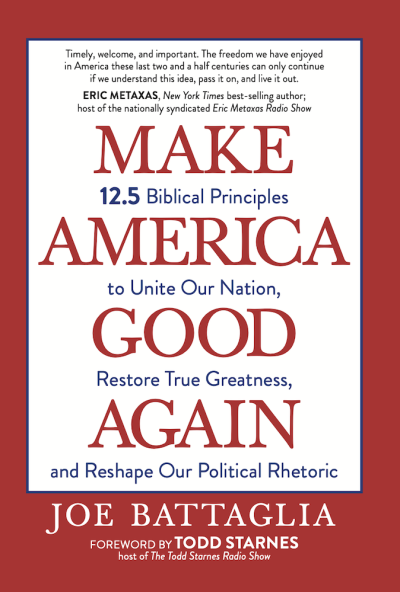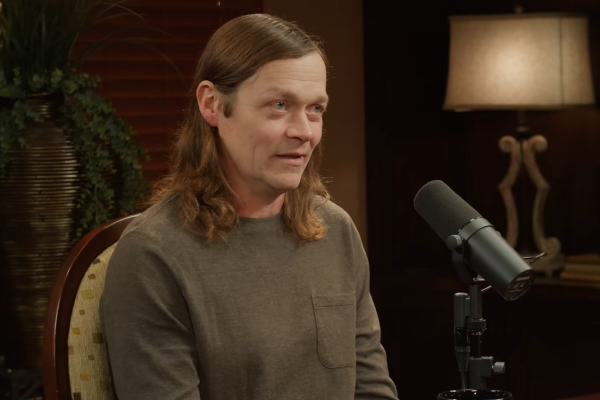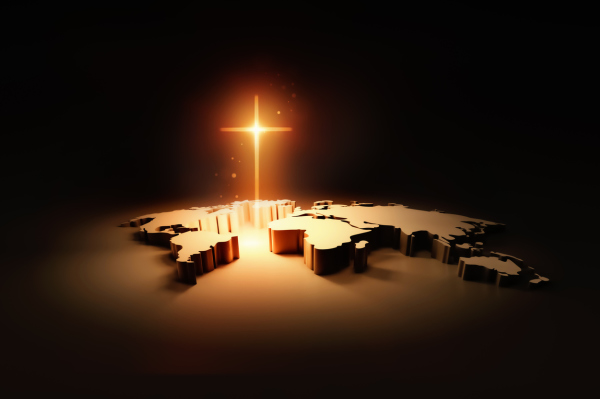'Make America Good Again': Christian media leader Joe Battaglia shares biblical solutions for unrest in US

When people hear the phrase “Make America Good Again” they may think of President Donald Trump’s similar campaign slogan, but popular Christian media leader Joe Battaglia is taking readers to the origin of the statement in his new book, Make America Good Again: 12.5 Biblical Principles to Unite Our Nation, Restore True Greatness, and Reshape Our Political Rhetoric.
The broadcaster, author and president of Renaissance Communications has been involved in marketing for almost 18 years. He was behind the marketing of some of the most beloved Christian films, such as “Passion of The Christ,” “I Can Only Imagine” and most recently “I Still Believe.”
His newest book, Make America Good Again, is not a political book but addresses some of the divisive issues plaguing the United States such as politics, immigration, gun control, climate change and poverty. In his writing, Battaglia, the son of Italian immigrants, insists that the country will be good when it truly follows the foundational principles from the Bible.
The following is an edited transcript of The Christian Post's interview with Battaglia.
Christian Post: The subtitle of Make America Good Again says the book is about discovering biblical truths to heal the cultural divide, and addresses our most critical issues. What are these issues that you're delving into in this book?
Battaglia: I like to write about faith and culture and I picked the title not really to play off of Trump's "Make America Great Again," but to really exemplify that quote that has been attributed to French historian Alexis de Tocqueville, who came to America in the 1830s to actually find out what made this country great. There were so many things that happened here at that early age, that the world was talking about America. So he came here and found so many wonderful things, which he documented in his Democracy in America.
A quote has often been attributed to him but he really did not say it, at least it can't be found in his book. Maybe he said it somewhere else, or maybe someone else said it and thought he could say it. I won't go through it because it's a really long quote. But the essence of it is at the end, where it says, when he looked for America's greatness, it wasn't until he went into the churches and saw pulpits of flame with righteousness that he [then] understood what made America great. America is great because she is good and if she ever ceases to be good, she'll cease to be great.
So the essence is, what was in those pulpits that enabled someone to say the greatness of America is found in preaching, in righteousness? Scripture says that righteousness exalts a nation. So I decided, let me have a little fun with this title and the topic because to me, greatness is about achievement but goodness is about character. We have lost our moral and national character. This has been troubling me for many years. I wrote about it in the Politically Incorrect Jesus five years ago, and I've seen a lot of that come to pass, unfortunately.
So I wanted to talk about what can we do to look at ourselves and see how we can become a good people again because what I see out there and what a lot of people see out in the news and all around is just a lot of hate, and violence, and animosity and racism, and anger and fear. This is not why Christ came and He is our model. He's our true north. He is the one who helps us become the people that we should be. So wanted to run my thoughts past him, if you will, and say, this is what He would be like, how can we model that? And how do we deal with the issues that are confronting us? So that's why I wrote it.
CP: Some people take issue with the phrase "Make America Great Again" because they say they are not able to look back to a time when America was great for them. Bringing it back to Jesus, as you did in your book, does provide a unique perspective in showing that good starts with God. Can you talk to that?
Battaglia: America has not been great to everyone and we understand that. That saddens me as it should everybody. We really need to make sure that America is great to everybody and the only way we can do that is if we reconcile ourselves. It's not the other person's fault. That's what we always love about who Christ is in our lives. He always calls us out to a standard, He doesn't call somebody else out. He always asks me, what am I doing my best to change myself? What am I doing to become a better neighbor?
So the reality is that I try to go through, first of all, the understanding that inherent in our national motto that quote, "E Pluribus Unum — from the many one," there is something about oneness that has power to it. Jesus talks about that in John 17 in His high priestly prayer. He could have asked the Father for anything on behalf of His disciples. And He asks one thing, unity and love. So I figured, there has to be something really powerful about unity. I think we understand it inherently, and that's what made our country great to a guy like de Tocqueville because he saw that within the context of what we were doing; there was a unity. The founding fathers in providing that motto for us, in a sense, of understanding that the genius of our nation is the genius of our faith in that, not that we're all the same in one, but that we are all different yet one.
What happens when we move out of that biblical frame of reference? We lose sight of the moral compass that God gives us and refuse to look at Him and who Christ is, we lose sight of what unity is about. When you have no unity, the enemy comes in to do everything he can to create division. The problem is that you move from appreciating the differences that we have as a nation. I need to appreciate the differences in you as I appreciate the differences in someone else. I'm not calling you out because of what you look like, what ethnic background you are, what race. We're all one in Christ. We are all one as a nation. When we lose sight of that, we see what's happening in our country today.
There are a lot of reasons why you can go into a politically correct agenda that is built around creating division, not unity. So we can't have unity any longer when these other forces are in play because the whole spirit behind that is division. I break that down in the book about how it started, why it was created as a divisive force, not as a unifying force, and brought here to America and so forth. So people should be aware that whenever they see things that are us versus them, as we see in our country today, that's not the way God wants it. That's not His model. That's not the model of the founding fathers and what could make the country great for everyone.
The issue we face today is this lack of appreciation for our differences and we hide behind firewalls of emotional detachment on the internet and everywhere else to separate ourselves from people unlike us. We blame everybody else for the ills of the world but in doing so, we miss God's grand design to mold us in His image. When we associate with others, unlike us, that's more like God's plan and when we don't, that's more like the world's plan that seeks to divide, not unify. I think we need to understand and realize our struggle with someone who we disagree with, who we may not like particularly, is the way God works to bring people together to find real common ground. We've lost sight of that.

CP: In this book, you tackle some hot button issues and you chose certain ones such as immigration, the culture war, fake news. What made you choose these particular issues?
Battaglia: When I looked at this last year, [these issues] were certainly around but I realized that these somehow intersect with Jesus. To me, immigration is such an important topic, because I'm the son of immigrants. My parents were born in Italy, so I'm a first generation [American]. So I understand that mentality. I realized as I walked through that, that the greatest immigration story is God leaving Heaven to come to earth, in His Son Jesus. Now that's quite an immigration story. Therefore, that makes Jesus the ultimate immigrant. He often referred to us as aliens and strangers and refugees. Scripture is replete with those references of God's people.
There is something powerful in Scripture that talks about us as aliens and immigrants and strangers in our land because it really wants us to understand what our true kingdom is like, what our true destiny is like. I think the whole problem with the immigration issue is that people don't look at others the way Jesus looked at them. That's part of the real problem. We get into all these political debates about how do you treat people and what do you do with them? We need to lose all the rhetoric of scapegoating and political wrangling over who's your neighbor. I realized that when I look into the heart and the eyes of Jesus, He will tell me to look into everybody's eyes the same way and I think if we do that, we'll find our neighbor as well. But I think we've lost sight of how to understand who our neighbor really is and how do we treat people and all that. So to me, that was an important story to tell about immigration.
The opportunity to intersect with people unlike us, I write, Jesus always has great models and stories for us so He went out of His way to be with someone He never should have been with — the woman at the well. No self-respecting Jew would go through Samaria, the land of half breeds. No self-respecting Jewish man would talk to a Samaritan woman. I mean you couldn't get more below your dignity other than maybe with prostitutes, lepers and other sinners as everybody was treated. He purposely goes out of His way to deal with someone, and what is the result of that? She gets so excited about what she finds. She goes and tells everybody in her city. So the principle there is that when we go out of our way to be with people, unlike us, they will go out of their way to tell people about us.
CP: What do you want people to take away from your book?
Battaglia: Well, if I was to pick one thing, I would use the word redemption because that is what we are uniquely called to. This is what should separate us. You've heard me talk about why we should unify and not be divisive, why we should be with people unlike us. That establishes common ground in order to tell people about Jesus. I think to me, an important part is we offer something no one else can — redemption, not in of ourselves, of course, but through Christ. So what we see is a world in chaos and confusion and in need of redemption. People have turned away from God, they've turned away from His moral code. I say in the book that when you lose your moral compass, you'll lose your common sense. That's why we see so many things happening around us that just don't make sense — what people are thinking, why are they acting that way? Well, the reason is because they've lost the moral compass. This is what happens to societies that lose it, you begin acting as we are acting.
To me, I think the message we all have is the one of redemption and that can take a lot of different forms. When you look at the woman caught in adultery and what Jesus does for her, He does not condemn her. He basically speaks to the heart of the men. I really think what happened there was that He got them to see in their hearts that they were the woman and the woman was them, holding the stone. All they could do was drop their stones and walk. You see the great thing about forgiveness and redemption is there is no condemnation. Love cannot be born out of condemnation, only out of redemption and conviction; it leads you to repentance. Scripture says that in Romans, it's God's mercy, kindness that leads us to repentance. I don't think many people like to follow somebody who's harsh and mean. So when you see all the harshness and meanness on the streets today, all the things that have been hijacked by those who would create division, they're not talking or speaking or living in that language of Christ, of bringing unification and forgiveness and reconciliation.
We need to be redemptive humanity more than anything else, and then truly understand the roles that God has given us as ambassadors as Paul says in 2 Corinthians 5:18-20, which is one of my favorite passages because after verse 17, where He talks to us about being new creations in Christ, He then gives us our job and our job description. So I'm an ambassador; the great thing about an ambassador is that he's not sent to fix the country he's in, but to represent the country he's from.
We are so busy trying to fix everybody and everything else, with harshness and meanness and fighting and rioting. That's not my job. My job is to represent the country I'm from and rise above that. That's why Jesus is really all over this. The world is here and they're fighting each other. Jesus is way up here. He offers something as He looks down on this silliness and nonsense, He says, "I'll give you a better way and there's power in that way."
He says, you're an ambassador and you're a minister of reconciliation, which simply means to restore friendship between you and God. If I do that, then what happens down here is going to be impacted. The things that we're fighting about, the racism is not going to happen, all the other -isms are not going to happen, and we're truly going to be like the believers in Acts, who lived and died for each other, and cared for the poor and the oppressed and all those who needed Jesus. That's my heart.





















